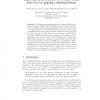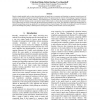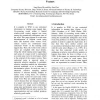61 search results - page 6 / 13 » Name Tagging with Word Clusters and Discriminative Training |
IBERAMIA
2004
Springer
14 years 2 days ago
2004
Springer
Abstract. In this paper we investigate the way of improving the performance of a Named Entity Extraction (NEE) system by applying machine learning techniques and corpus transformat...
ICDE
2005
IEEE
14 years 9 days ago
2005
IEEE
With the increasing amount of biomedical literature, there is a need for automatic extraction of information to support biomedical researchers. Due to incomplete biomedical inform...
LREC
2008
13 years 8 months ago
2008
Based on simple methods such as observing word and part of speech tag co-occurrence and clustering, we generate syntactic parses of sentences in an entirely unsupervised and self-...
COLING
2002
13 years 6 months ago
2002
It is popular in WSD to use contextual information in training sense tagged data. Co-occurring words within a limited window-sized context support one sense among the semantically...
EMNLP
2007
13 years 8 months ago
2007
It has been widely observed that different NLP applications require different sense granularities in order to best exploit word sense distinctions, and that for many applications ...



